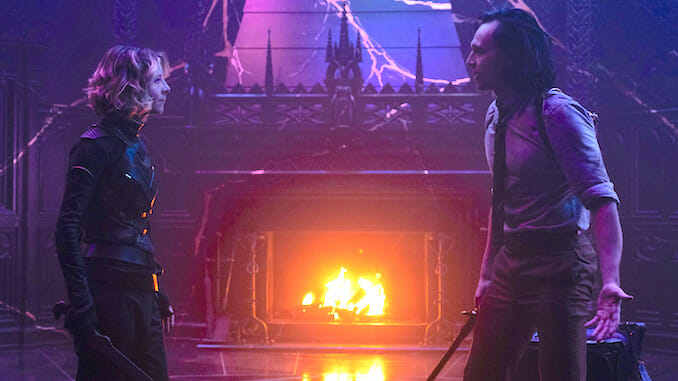A Canonically Hamstrung Loki Finale Only Highlighted the Season’s Overall Problems
It was full of itself, but not in the right ways.
Photo Courtesy of Disney+
In my review of the first two episodes of Loki, I started out by talking about webisodes; that Marvel’s Disney+ shows, instead of spinning off to tell more detailed character stories of the lesser-known heroes, are instead sub-narrative connective tissue between movies. They seem clearly engineered to lead up to and leave the big resolutions to the films, each starting off with great potential and fizzling out as they are pulled back towards the MCU’s overarching storyline. That’s the most ironic regarding Loki itself, which is all about fighting against one “set” timeline, championing free will, and railing against the pruning of “variants.” And yet, the MCU itself has pruned its variants (goodbye to the Netflix Marvel disaster, Agents of S.H.I.E.L.D.’s one-way connection to the movies, and more). Everything now is on one pre-approved timeline that continues to pay out billions of dollars and dividends, even as it dilutes its own storytelling impact.
The Loki finale was ultimately an egregious example of this problem, though the point of the entire season has been up for grabs anyway. If it was to make Loki into a hero, well, he already got that arc in the movies, ending with a beautiful and heartbreaking sacrifice to save Thor from Thanos. If it was to introduce the TVA and He Who Remains for the next Phase of the MCU, it managed that in just 30 mins of exposition—but it did so at the expense of the season and of Loki as a character.
This Loki, frankly, was kind of a sad-sack loser. He wasn’t very fun, he didn’t really use magic, everyone guessed his “schemes” immediately, and he backed down to Mobius and to Sylvie pretty easily. You could argue, as Mobius and later the Loki variants do, that Lokis are born to lose. And yet, Sylvie—a Loki variant (more on that distinction in a minute)—was always a badass who cut her way through to glorious purpose until the end. In fact, it was Sylvie, not Loki, who had the clearer storyline and ending, and ultimately was the one who had the more major impact on the MCU as a whole by committing a vengeful murder to unleash multiple timelines rather than take the throne.
That all sounds pretty interesting, even if we had to accept the odd sidelining of Mobius and Loki throughout the back half of the season to get there (all I wanted was Mobius and Loki as Time Cops, was that so much to ask?) But in practice, it was exceptionally boring. Loki, like The Falcon and the Winter Soldier, was too short to achieve its aims. As I have repeated over and over again, the benefit of Marvel doing TV shows like this should have been to dive more into these characters and their stories, which don’t get spotlighted in the movies. Yes the Netflix Marvel series were bloated, but they were mishandled from top to bottom. A 13-episode Loki show would have been completely different than 13 episodes of Iron Fist. Plus, Loki is supposed to be weird and fun.
Instead, we got a finale that was almost entirely exposition. And God bless Jonathan Majors, he sold it all the best he could. He Who Remains was weird and interesting, but it also made Loki into the level-headed straight man. That’s really not Loki. What’s even worse about the extraordinary info dump in the finale is that it didn’t actually mean anything. Sylvie’s actions set into motion a splintering timeline that will surely be addressed in Doctor Strange and the Multiverse of Madness. But regarding this series? Loki? Mobius? Renslayer? “Loki will return in Season 2!” Why? To do what?
-

-

-

-

-

-

-

-

-

-

-

-

-

-

-

-

-

-

-

-

-

-

-

-

-

-

-

-

-

-

-

-

-

-

-

-

-

-

-

-








































